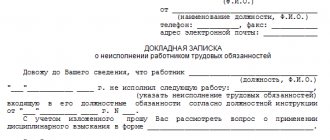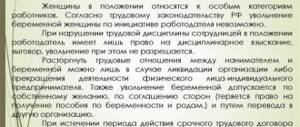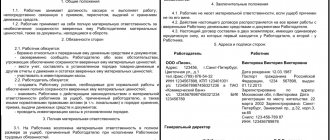Every person officially working in a company signs an employment contract with the employer. Based on this document, different types of disciplinary sanctions can be applied to an employee in the presence of various violations, for which the main provisions of the Labor Code are taken into account. They are represented by certain measures of punishment, and if a sufficient number of violations are recorded on the part of an employee of an enterprise, this may become the basis for his official and compulsory dismissal.
What is a disciplinary offense?
If any disciplinary offense is detected on the part of an employee, then various penalties are applied to him. This offense is represented by failure to fulfill one’s obligations in the workplace. For example, the rights of other employees may be violated, management orders may not be followed, or the requirements of local regulations may be violated.
All actions that constitute disciplinary offenses are listed in Resolution of the Plenum of the Supreme Court No. 2. Such actions are certainly accompanied by signs:
- labor discipline is violated, therefore, if a citizen simply does not want to take part in the public life of the company, then this cannot become the basis for using various types of disciplinary sanctions;
- when violations are detected, there must be evidence of the guilt of a particular specialist, so if he did not come to work due to natural disasters, fire or getting into an accident, then this is a good reason, and therefore cannot be regarded as absenteeism.
Penalties may only be applied if there is evidence of the employee’s guilt. If he can prove that he is not guilty of certain actions, then under Art. 192 of the Labor Code of the Russian Federation, disciplinary sanctions cannot be used.
How many reprimands do you need to receive to terminate an employment contract?
It is unknown how many reprimands are needed to terminate an employment relationship. After all, Russian labor legislation does not give a clear answer to this question. In fact, the termination of employment relations occurs sequentially, through the imposition of several types of disciplinary liability, for example, a remark - a reprimand - a reprimand with entry into the work book - a financial penalty - dismissal.
Please note! The employer has the right to apply disciplinary measures based on Article 192 of the Labor Code of the Russian Federation. However, this does not mean that it is his responsibility. In fact, the boss himself chooses whether to punish an employee or not.
Based on all of the above, we can conclude that the number of reprimands is not at all important when imposing such a punishment as dismissal. An employer can tolerate an employee for a long time and then fire him, or he can terminate relations with him at the first serious violation.
Please note that dismissal with a reprimand is possible under the following circumstances:
- the employee does not want to perform job duties;
- the employee has violated labor discipline more than once;
- the employee previously committed disciplinary offenses for which he was punished.
Attention! Our qualified lawyers will assist you free of charge and around the clock on any issues. Find out more here.
Features of punishment
These penalties can be general or special. The first are listed in Art. 192 of the Labor Code, therefore they can be applied to any employee of the enterprise. Special ones are used only for certain categories of employees. They are usually established by various laws or specified in the charter of the enterprise.
The most common types of disciplinary sanctions prescribed in the Labor Code are applied. They can be used for any employee who has violated labor discipline or failed to comply with the requirements of the company management. It does not matter what position he holds or what job duties he performs.
It is prohibited to use various types of punishment that are not listed in the Labor Code, for example, it is not allowed to apply a disciplinary sanction in the form of a fine.
Various penalties can only be used by the immediate manager of the company or a responsible person who has the appropriate powers delegated in an official manner. The same person chooses which measure will be used. In this case, the severity of the existing offense is taken into account, as well as the circumstances of the process, since mitigating nuances are often identified.
Often, employees, after various penalties have been applied to them, turn to court for help. After considering all the circumstances of the case, the court may find that dismissal or other punishment are unlawful actions on the part of the employer, therefore all the employee’s demands are satisfied.
If, within a year after a penalty was applied to a citizen, there are no complaints about his work or behavior, then it is automatically recognized that he has no punishments. Additionally, before the end of the one-year period, the status of a respectable specialist can be returned to the employee by sending a special written petition to the employer. It indicates a request to remove the penalty.
Is a warning a disciplinary sanction?
The most common punishments applied to an employee are a reprimand, warning, reprimand, disqualification, and fine. But not all of them relate to punishments for violation of work discipline.
A reprimand and reprimand are disciplinary sanctions prescribed in the Labor Code of the Russian Federation. The legislation of the Russian Federation classifies the other listed measures as administrative.
But there is an exception. Charters and regulations on discipline for employees of certain services, approved at the state level, provide for additional penalties: warning, compensation for damages, disqualification, reprimand, severe reprimand, deprivation of honorary signs and titles, etc. Therefore, disputes about whether a warning is disciplinary action or not continues.
If the organization belongs to services that have a discipline statute approved at the state level, then the employer can use a type of punishment such as a warning in the form of a penalty. In addition, if the organization has developed and approved a discipline regulation that specifies such a punishment, then it can also be applied to the violator. But in this case, the warning will no longer be a measure of disciplinary action, but a measure of disciplinary action.
Read more: Procedure for applying disciplinary action
When are they used?
Penalties can be used by the employer only if there are compelling reasons. All of them are listed in Art. 192 TK. Therefore, different types of disciplinary sanctions under the Labor Code of the Russian Federation can be applied in the following situations:
- failure to fulfill one's main job responsibilities under an employment contract;
- dishonest performance of functions in the workplace;
- performing various actions that are not permitted by company regulations;
- the basic provisions of job descriptions are violated;
- labor discipline is not observed, for example, regular lateness or unreasonable absence from the workplace is detected.
Based on the above violations, the employer can certainly use different methods of punishment. Therefore, employees themselves must ensure that they carry out their duties responsibly.
What is a reprimand and how does it differ from a remark?
Article 192 of the Labor Code of the Russian Federation provides for various disciplinary sanctions. One of them is a reprimand, which is assigned for improper performance of official duties . The decision on the exacting measure is made by the manager , of which the employee is notified.
Attention! A working citizen cannot be punished more than twice for the same violation of discipline or failure to perform duties.
Article 192 of the Labor Code provides for another type of disciplinary sanction - reprimand . In legal terms, a reprimand and a reprimand do not differ from each other, since they have the same force and the same consequences, as well as the procedure for drawing up a punitive measure. However, we can conclude that the remark refers to a more lenient type of penalty .
The remark serves as a kind of signal to which the offending employee must heed. A responsible and diligent working citizen must calmly listen to criticism of himself from management and take measures to ensure the proper performance of work duties.
Comment
This method of punishing negligent workers is considered the most common. A disciplinary sanction is imposed in the form of a reprimand for minor offenses. For example, if minor damage is caused to company property or disciplinary standards are violated. At the same time, there should be no negative consequences of such employee misconduct for the enterprise.
A reprimand is usually applied if this is the first time that a specialist has performed his duties improperly. In order to apply a disciplinary sanction in the form of a remark, even when hiring a citizen, it is necessary to familiarize him with the job descriptions.
How is a comment made?
The very process of using such punishment involves the implementation of actions on the part of management:
- Initially, the employer must require written explanations from the employee;
- an explanatory note is prepared within two working days after receipt of the request;
- in the explanatory note, the specialist can indicate the presence of evidence that there is no guilt or that there were certain unforeseen circumstances due to which he violated the requirements of the company’s management;
- the employer independently decides whether the existing reasons are valid, since such circumstances are not stipulated in the Labor Code;
- Most often, no punishment is applied if the employee was sick or did not have the necessary materials to perform his job duties;
- if the reason is recognized as valid, then the employer does not apply punishment in the form of a reprimand to the employee;
- if there are no compelling reasons for violating the company’s requirements, then the manager issues an order on the basis of which a reprimand is given to the employee;
- The specialist signs this order, and if he refuses to sign, then an act is drawn up by management.
The standard period for imposing a disciplinary sanction is one year. It is possible to remove it ahead of schedule, and this process is carried out at the initiative of the employer or on the basis of a petition drawn up by the employee, the head of the department where he works, or a representative of the trade union.
About payments and compensations
Upon dismissal based on a reprimand, the employer must make a final settlement with the dismissed employee. The calculation should include wages for the time actually worked by the person, as well as compensation for unused vacation . In case of dismissal from a position at the initiative of the employer, severance pay is not paid.
The calculation must be made on the last working day of the employee subject to dismissal. If the employee is absent from the workplace on the last day, the due payments must be made no later than the next day from the written request of the dismissed worker.
Rebuke
This method of punishment is considered quite specific, and the legislation does not contain information about what offenses it can be used for. Typically, disciplinary action in the form of a reprimand is applied if serious misconduct is identified that leads to certain negative consequences for the company. Additionally, it is used for regular minor violations.
Most often, a reprimand is used in the following situations:
- violation of the basic provisions of the Labor Code;
- regular absenteeism;
- violation of the charter or internal other regulatory documents of the enterprise;
- failure to fulfill his official duties, which the company employee was familiarized with in advance against signature.
This type of disciplinary sanction may be applied if a citizen refuses to undergo a medical examination or advanced training courses. If a person is found to have intentionally or unknowingly carried out actions that caused the company to suffer losses, he or she will usually also be reprimanded. This penalty is imposed only after the issuance of an official order by the head of the enterprise. This punishment can be used for varying periods of time, but is usually imposed for 6 months.
Most often, a reprimand is used after a reprimand has been made. It is not allowed to apply several types of disciplinary sanctions at once under the Labor Code of the Russian Federation. A severe reprimand can only be issued if the employer has written evidence of the guilt of a particular employee.
Dismissal procedure
The dismissal process is regulated at the legislative level and has a certain sequence of actions, violation of which by the employer will have negative consequences if the employee approaches government authorities with a complaint. In general, the algorithm for dismissal for a reprimand is as follows:
| No. | Type of action | Period of execution | A comment |
| 1 | Establishing the fact of an employee’s action that is incompatible with further labor relations | 30 days, if a violation is identified based on the results of the audit - up to 2 years. | The fact must be confirmed in writing in the form of a report, witness testimony, certificates from investigative authorities, etc. |
| 2 | Receiving a written explanation from the employee | up to 2 working days from the date of the incident. When an employee is on sick leave, the period of sick leave is extended for the duration of the certificate of incapacity for work. | If you refuse to explain your actions or fail to provide such an explanation within a reasonable time, a report is drawn up. |
| 3 | Conducting an internal investigation | Within 30 days from the date of violation, if necessary, the period can be extended. | Internal investigations are not carried out in all organizations, but for an objective consideration of the causes and consequences of the misconduct committed, such an action is quite important. |
| 4 | Issuance of a dismissal order | 30 days from the date of commission of the offense (except for misconduct in financial activities) during an official investigation, temporary disability, or employee leave, the period is increased for this time, but not more than 6 months. When conducting a criminal investigation against an employee, the period for issuing an order may be extended for the duration of the investigation. | If the order includes the fact of a secondary violation of discipline or labor duties, then it must be confirmed by written documents. |
| 5 | Familiarization of the employee with the dismissal order | 3 working days from the date of signing the order. | If an employee refuses to familiarize himself with the order, a report about this is drawn up. |
| 6 | Making financial calculations and personnel records | On the day the order is issued | If the employee refuses to pick up the work book, a notice of the need to pick it up should be drawn up and sent to the employee by registered mail with delivery receipt. Otherwise, the employee may qualify for payment of funds before the date of actual transfer of the work book. |
The process is also described in sufficient detail in Article 193 of the Labor Code of the Russian Federation. If the dismissed employee does not agree with the actions of the employer, he has the right to appeal the decision in court. When dismissing an employee for a negative article, the opinion of the representative body of the enterprise’s employees should be taken into account.
How is a reprimand issued?
The process of holding people accountable must be implemented in consistent actions. Initially, the specialist’s immediate supervisor must submit a memo or special report to the company’s management. This document contains information:
- date when the event occurred;
- the circumstances under which the violation was committed by the company employee;
- the names of all persons who are related to this offense.
The violator is given the opportunity to submit written explanations to the employer. If this type of disciplinary sanction is applied for absenteeism or other violations, then the relevant information must be entered into the personal file of the enterprise employee. Such punishment may serve as a basis for depriving an employee of a bonus or other monetary incentives. If no more violations are detected within a year, the penalty will be lifted automatically. It is possible to remove a reprimand early if the employer has a loyal attitude towards the employee.
Dismissal
This method of punishment is considered the most severe. It is conditioned only by the presence of a truly serious offense on the part of an employee of the enterprise. The use of such punishment is the right of the head of the company, therefore, in the presence of mitigating circumstances, he may not resort to dismissal.
Disciplinary action in the form of dismissal is applied in situations:
- there are several cases of violation of labor regulations at the enterprise, for example, regular lateness or ignoring job descriptions;
- gross misconduct, for example, showing up at work while intoxicated, disclosing important information about the company, theft or damage to company property.
Such violations are truly significant. The employee’s guilt must be confirmed by official documents in order to establish that it was he who committed the disciplinary offense. Types of disciplinary sanctions can only be applied individually, and before dismissal it is always necessary to record other minor violations, as well as issue reprimands or comments.
Disciplinary dismissals of employees
Employees do not always properly perform their job duties. What should an employer do if he wants to part with a negligent employee?
According to Art. 192 of the Labor Code of the Russian Federation, disciplinary sanctions include reprimand, reprimand and dismissal on appropriate grounds for guilty actions that resulted in loss of confidence in the employee. In order for a person to be punished by dismissal for guilty actions, they must be committed at the place of work and in connection with the performance of job duties.
So, on what grounds can a disciplinary sanction in the form of dismissal be applied?
Repeated failure by an employee to perform labor duties without good reason, if he has a disciplinary sanction
Failure to comply is understood as a violation of legal requirements, obligations under an employment contract, internal labor regulations, job descriptions, regulations, orders of the employer, technical rules, etc. As an example, the absence of an employee from work or the workplace without good reason. If the employment contract with the employee or the local act of the employer does not stipulate the workplace of this person, then it is understood that this is the place where the employee must be or where he needs to arrive in connection with his work and which is directly or indirectly under the control of the employer. This is explained by the Plenum of the Supreme Court of the Russian Federation in its resolution No. 2 dated March 17, 2004 (as amended on November 24, 2015) “On the application by the courts of the Russian Federation of the Labor Code of the Russian Federation.”
Repeated failure to comply means repeated at least twice, and the employer has the right to dismiss the employee only if the culprit has already received a reprimand or reprimand.
GOOD TO KNOW
The basis for applying a disciplinary sanction in the form of dismissal is the commission of a disciplinary offense, that is, the failure or improper performance by an employee, through his fault, of the labor duties assigned to him. It is important to note that the job responsibilities of employees are set out in job descriptions, employment contracts, and local legal acts. The employee must be familiar with the job description and local legal acts. If the obligation is not provided for, it cannot be held accountable for its violation.
One-time gross violation of labor duties by an employee
The Labor Code lists what these violations are: absenteeism, showing up at work while under the influence of alcohol, toxic or narcotic drugs, disclosing state, commercial or official secrets, including disclosing personal data of another employee, committing theft, violating labor protection requirements, if this entailed grave consequences or created a threat of such consequences (clause 6, part 1, article 81 of the Labor Code of the Russian Federation).
- Making an unjustified decision by the head of an organization (branch, representative office), his deputies and the chief accountant, which entailed a violation of the safety of property, its unlawful use or other damage to the organization’s property.
- A one-time gross violation by the head of the organization (branch, representative office) or his deputies of their labor duties.
- Repeated gross violation by a teaching staff member of the charter of an organization carrying out educational activities within one year (clause 1 of Article 336 of the Labor Code of the Russian Federation).
- Sports disqualification of an athlete or violation of anti-doping rules by the latter (Article 348.11 of the Labor Code of the Russian Federation).
- Commitment of guilty actions by an employee servicing monetary or commodity valuables, if this resulted in a loss of trust in him by the employer.
- Failure to provide information about property or concealment of information in violation of the requirements of the law for certain categories of persons, for example, those holding public office.
- Commitment of an immoral offense by an employee performing educational functions.
Thus, if an employee commits any of the above actions, the employer can fire him. In this case, the gravity of the committed act and the circumstances under which it was committed must be taken into account.
GOOD TO KNOW
Based on clause 5, part 1, art. 81 of the Labor Code of the Russian Federation, an employment contract can be terminated by the employer in the event of repeated failure by the employee to fulfill his work duties without good reason, if he has a disciplinary sanction.
How to fire an employee for disciplinary action?
- The employer must first require a written explanation from the employee. If an employee refuses to write an explanatory note, a report about this is drawn up. Refusal to provide explanations is not an obstacle to imposing a disciplinary sanction.
- No more than a month must pass from the date of discovery of the misconduct, not counting the time the employee was ill, on vacation, or time to take into account the opinion of the representative body of employees. The day of detection of the misconduct, according to the explanation of the Plenum of the Supreme Court of the Russian Federation dated March 17, 2004 No. 2 (as amended on November 24, 2015) “On the application by the courts of the Russian Federation of the Labor Code of the Russian Federation,” is considered the day when the person to whom the employee is subordinate for work (service) , it became known that an offense had been committed.
- The order for the penalty must be announced to the employee against signature; the penalty can be appealed to the labor inspectorate or the body for the consideration of individual labor disputes.
- The fact that an offense has been committed must be documented, therefore, memos, acts and explanations of the employee, if any, must be attached to the order for collection.
- You can dismiss an employee by drawing up one order - according to the unified T-8 form. However, the issuance of two orders (one on punishment, the other on dismissal) is also legal. Rostrud indicates this in its letter dated 06/01/2011 No. 1493-6-1.
- Make an entry in the employee’s work book and give him all payments due.
IMPORTANT IN WORK
The commission of an offense for which dismissal may be applied must be documented, for example, by drawing up an appropriate act, report, memo, report on the results of the inspection.
How is dismissal formalized?
There must be compelling reasons to impose this penalty. Additionally, you need to format it correctly.
An act of theft is necessarily formed, and an explanatory statement is also required from the violator himself. The opportunity to draw up an explanatory note is provided only within two days.
A penalty represented by dismissal must be drawn up in the form of an order. A copy of this document is provided to the employee for review. Based on this order, an order to dismiss the employee is issued. The citizen receives a salary and compensation for vacation, and information is entered into the work book that the employee was fired after committing a disciplinary offense.
It will not be possible to fire a person if he is on vacation or sick leave.
Employees who cannot be fired for reprimanding
The law establishes a list of persons who cannot be dismissed even on grounds such as a reprimand. This category of citizens includes:
- pregnant women;
- women with children under three years of age;
- parents with a disabled child;
- employees who are the sole breadwinners and have children under three years of age.
In addition, it is impossible to impose penalties and, accordingly, dismiss persons who are on vacation or sick leave .
Design rules
Different penalties may be applied to employees who commit various offenses and violations. The use of various types of disciplinary sanctions in the Russian Federation is considered widespread, but certain rules of this process must be observed.
A specific violation must be recorded, for which different documents can be generated:
- an act indicating that the company employee was absent from the workplace during working hours;
- a report containing information that the work was not completed within the established time frame;
- decision of the commission studying the nuances of the detected shortage.
After identifying a violation, the employee who is the culprit is determined. Evidence is prepared, after which an explanatory statement is requested. If this document is missing within two days, then a corresponding act is generated.
If the employee has good reasons for violations, this may act as a mitigating circumstance, so a lighter punishment may be applied. If there are no grounds for a violation, then an order is issued to subject him to disciplinary action, represented by dismissal.
How long does the penalty apply?
Typically, a decision is made to hold the employee accountable within a month after a specific event or violation is discovered. If more than 6 months have passed, then it is not allowed to punish an employee of the enterprise. This period does not include the time when the employee did not go to work for good reasons.
Often, various violations are discovered after various inspections or audits. Under such conditions, the period during which company specialists can be held liable increases to two years.











